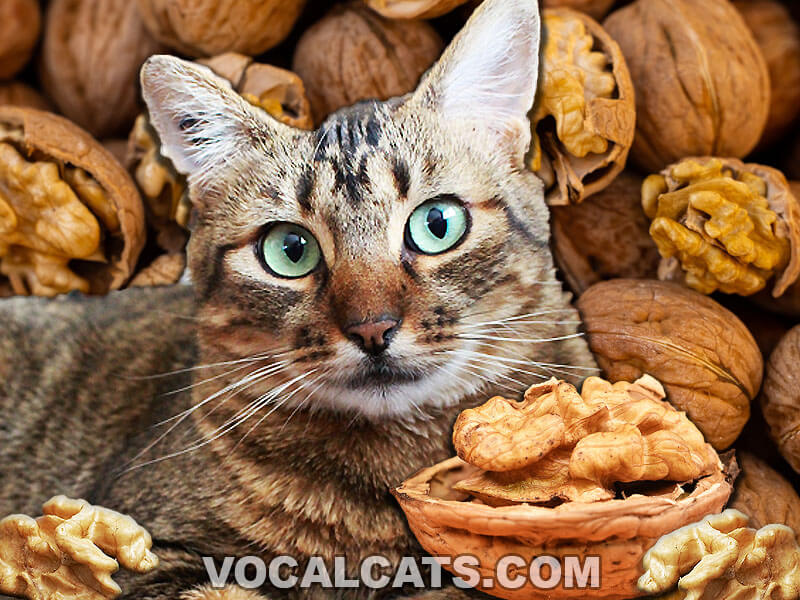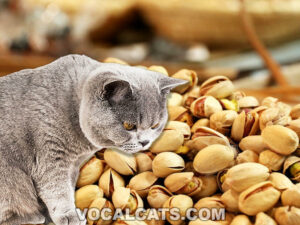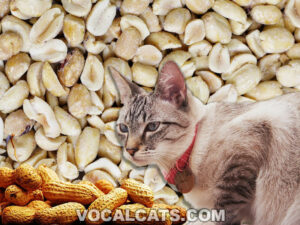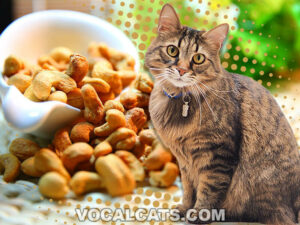Can Cats Eat Walnuts? No, cats should not eat Walnuts because they have a high-fat content that can lead to health issues, pose a choking hazard due to their hard shells and size, and may be contaminated with aflatoxin, a toxic substance produced by certain molds that can cause severe liver damage.
Many pet owners are curious about what their pets can and cannot eat. For cat owners, the question often arises, “Can my cat eat Walnuts?” As more people incorporate Walnuts into their diets for their numerous health benefits, it’s only natural to wonder if you can safely share Walnuts with your feline companions.
In this piece, we will delve into the topic of cats and Walnuts. While this article focuses on whether cats can eat Walnuts, it is essential to note that other nuts, such as chestnuts, should also be avoided due to their high-fat content and potential for causing gastrointestinal upsets in cats.
RECOMMENDED: Can Cats Eat Peanuts? 10 Dangers Every Cat Owner Should Know!
Contents
- Can Cats have Walnuts?
- What are Walnuts?
- What are raw Walnuts?
- Are Walnuts bad for Cats?
- Can cats eat Walnut shells?
- So, are Walnut shells dangerous for Cats?
- Are Walnuts toxic to Cats?
- Are Walnuts safe for Cats?
- Are Walnuts good for Cats?
- Are Walnuts ok for Cats?
- Are Walnuts poisonous to Cats?
- Are Cats allergic to Walnuts?
- Do Cats like Walnuts?
- What to do if cat Eats Walnuts?
- Cats and Walnuts
- Safe and feline-friendly alternative to Walnuts for cats
- So, Can Cats Eat Walnuts?
- Related Questions
Can Cats have Walnuts?
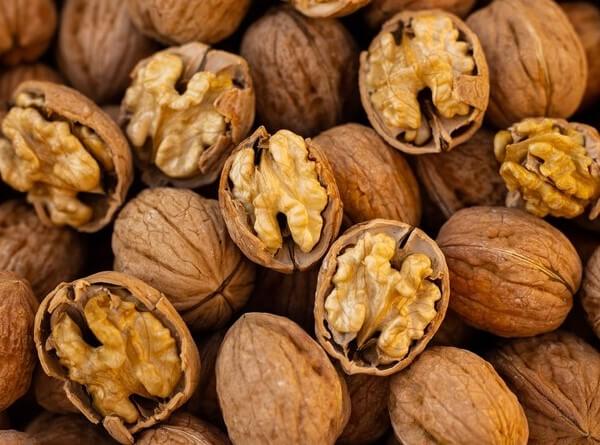
The short answer is no, cats should not eat Walnuts. While Walnuts are not toxic to cats, they are not a suitable snack. This is primarily due to their high-fat content and the potential choking hazard the nuts and shells can pose.
What are Walnuts?
Walnuts are a type of nut from the Juglans tree genus. Humans commonly consume these nuts for various health benefits, such as improving heart health and cognitive function. They are rich in healthy fats, fiber, vitamins, and minerals, making them an excellent addition to a balanced human diet.
What are raw Walnuts?
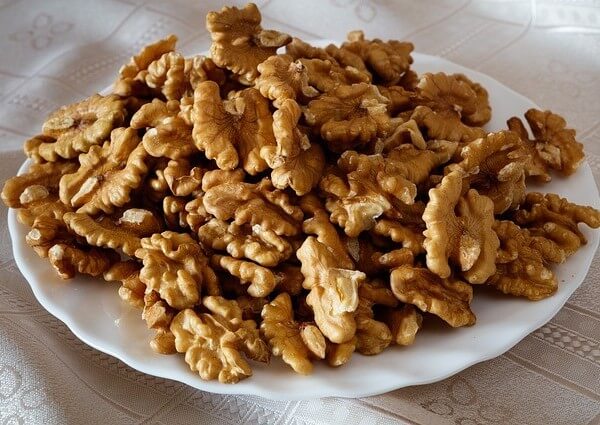
Raw Walnuts refer to Walnuts that have not been processed or cooked. They are removed from their hard outer shells and are consumed in their natural, unaltered state.
Raw Walnuts are packed with nutrients and provide the most health benefits compared to processed or cooked Walnuts.
READ ALSO: Can Cats Eat Pistachios?
Are Walnuts bad for Cats?
Yes, Walnuts are bad for cats. Walnuts can be harmful to cats for several reasons.
Here are five reasons why Walnuts are not suitable for cats:
1. High-Fat content
Walnuts are high in fat, which can lead to obesity and other health issues in cats if consumed in large quantities. Cats require a specific balance of nutrients in their diet, and Walnuts can disrupt that balance.
2. Choking hazard
Walnuts, especially when still in their shell, can be a choking hazard for cats.
Cats may try to chew on the hard shell, causing it to break into smaller pieces. The hard, brittle, and sharp shell fragments can cause choking when they become lodged in their throat.
As a result, your furry friends may experience gastrointestinal blockages or internal injuries like internal bleeding in the throat or stomach.
3. Difficult to digest
Walnuts can be difficult for cats to digest properly due to their high-fat content and composition, which is not ideal for a cat’s carnivorous digestive system. This may result in gastrointestinal issues, such as vomiting, diarrhea, or constipation if consumed by cats.
4. Aflatoxin contamination
Walnuts can sometimes be contaminated with a toxic substance, aflatoxin, produced by certain molds. Aflatoxin can harm humans and animals, including cats, causing severe liver damage if ingested in large amounts.
5. High sodium content
Some store-bought Walnuts contain high salt content due to added salt during processing. This high salt content can harm a cat’s health, leading to dehydration, high blood pressure, and kidney problems.
Remember that the recommended daily allowance of sodium for an adult cat is around 21 milligrams per 100 calories of food, which typically translates to roughly 42 milligrams of sodium per day for an average-sized cat.
If your furry friends consume more than that, they may experience sodium poisoning.
Generally, the safe amount of salt for a cat to consume daily depends on factors such as the cat’s size, weight, and overall health.
READ NEXT: Can Cats Eat Almonds?
Can cats eat Walnut shells?

No, cats should not eat Walnut shells. Walnut shells can be dangerous for cats due to their hard and brittle nature, which can cause choking or damage to the gastrointestinal tract.
Instead, it’s better to feed your feline friends safer alternatives which we will discuss more below.
So, are Walnut shells dangerous for Cats?
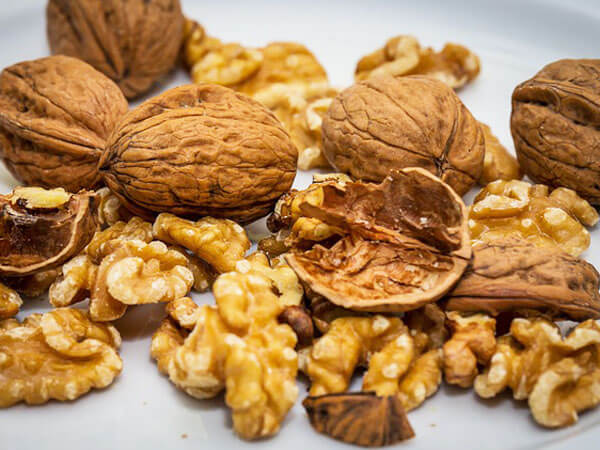
As we can see, Walnut shells are dangerous for cats. The shells can cause choking, or if ingested, they can lead to gastrointestinal blockages and internal injuries.
When our feline friends have gastrointestinal blockages, they may experience the following signs of distress and discomfort:
- Vomiting.
- Diarrhea.
- Constipation
- Abdominal pain.
- Loss of appetite.
- Lethargy.
- Weakness.
- Changes in behavior (Becoming more irritable or hiding)
If you notice any of these signs or symptoms after your kitties have ingested Walnut or Walnut shells, we highly recommend that you consult a veterinarian immediately to address the issue. The vet will provide appropriate treatment to prevent complications or further damage.
Therefore, it is essential to keep Walnut shells away from cats to prevent accidents.
Are Walnuts toxic to Cats?
Walnuts are not toxic to cats, but as mentioned earlier, they can pose several health risks to your fuzzy friends.
These risks include high-fat content, choking hazards, and potential aflatoxin contamination.
Thus, it is best to avoid giving your cats Walnuts to ensure their safety and well-being.
DON’T MISS: Can Cats Eat Cashews?
Are Walnuts safe for Cats?
While Walnuts are not toxic to cats, they are not considered safe due to their various risks. Sticking to cat-specific treats and food is best to ensure that your cat’s diet remains balanced and healthy.
Are Walnuts good for Cats?
Although Walnuts offer some potential health benefits for humans, these benefits do not necessarily apply to cats.
That’s because our fuzzy friends have different dietary needs, and there are better food sources than Walnuts.
However, in tiny quantities and on rare occasions, Walnuts may not cause any harm to your feline family member.
Here are five ways Walnuts can be good for cats:
- Omega-3 fatty acids: Walnuts contain alpha-linolenic acid, an omega-3 fatty acid with anti-inflammatory properties. This could help support skin and coat health, although cats would be better off getting these nutrients from animal sources like fish oil.
- Antioxidants: Walnuts contain antioxidants, which help protect cells from damage caused by free radicals. These could support a cat’s overall immune system and health, although cats would benefit more from antioxidants derived from animal sources.
- Fiber: Walnuts contain some fiber, which could help promote healthy digestion and prevent constipation in cats when given in small amounts. However, cats have a short digestive tract adapted to a carnivorous diet, so they don’t require large amounts of fiber.
- Vitamins and minerals: Walnuts contain several vitamins and minerals, such as vitamin E, magnesium, and potassium, which could contribute to a cat’s overall health. However, cats require specific nutrients found in animal-based foods, and the nutrients in Walnuts may not be in a form that cats easily absorb.
- Mental stimulation: A cat attempting to crack open a Walnut could stimulate their natural hunting instincts. However, this should be done cautiously and under supervision, as the Walnut shell poses significant risks to cats.
It is essential to reiterate that despite these potential benefits, the risks associated with feeding Walnuts to cats far outweigh any potential gains. Sticking to cat-specific treats and food is best to ensure that your cat’s diet remains balanced and healthy.
Are Walnuts ok for Cats?
Walnuts are not ideal for cats, and it is best to avoid giving them to your feline friends. Instead, it is a good idea to give them cat-specific treats and food to meet their daily dietary needs.
RECOMMENDED: Can Cats Eat Pecans?
Are Walnuts poisonous to Cats?
As previously mentioned, Walnuts are not poisonous to cats, but they can pose several risks. Keep your cat safe by not allowing them to consume Walnuts or any Walnut-based products.
Are Cats allergic to Walnuts?
Cats can develop allergies to various substances, including foods. While Walnut allergies are not common in cats, your fuzzy family member can have an allergic reaction to Walnuts.
If you suspect your four-legged friend has consumed Walnuts and is experiencing symptoms such as vomiting, diarrhea, or skin irritation, call and consult your veterinarian immediately.
Do Cats like Walnuts?
Cats may be curious about the smell and texture of Walnuts, but they are obligate carnivores, meaning their primary source of nutrition should come from animal-based proteins.
It is unlikely that cats would naturally crave Walnuts, and their interest may be more about curiosity than a genuine desire to consume the nuts.
What to do if cat Eats Walnuts?
If your cat has ingested a small number of Walnuts, monitor them closely for any signs of discomfort, illness, or allergic reaction.
Contact your veterinarian immediately if your cat has consumed many Walnuts or displays symptoms such as vomiting, diarrhea, or difficulty breathing.
Your veterinarian may induce vomiting, provide supportive care, or perform other appropriate procedures to ensure your cat’s safety and well-being.
Cats and Walnuts
Can cats eat salted Walnut?
No, cats should not eat salted Walnuts. In addition to the risks associated with Walnuts, the high salt content can lead to health issues such as dehydration, high blood pressure, and even kidney problems in cats.
When a cat consumes too much salt, he may experience sodium poisoning, also known as salt toxicity or hypernatremia.
Signs and symptoms of sodium poisoning in cats include the following:
- Vomiting.
- Diarrhea.
- Excessive thirst.
- Increased urination.
- Lethargy.
- Loss of appetite.
- Wobbliness or incoordination.
- Seizures (in severe cases).
- Coma (in severe cases).
- Death (in severe cases).
Generally, cats are more sensitive to sodium than humans, and their bodies cannot tolerate excessive salt intake.
The amount of salt in store-bought Walnuts varies depending on the brand and the processing method.
Unsalted Walnuts have minimal salt content, typically less than 1 gram per 100 grams of nuts.
However, salted varieties can contain significantly more salt, ranging from 1 to 3 grams or more per 100 grams of nuts.
It is crucial to check the nutritional label on the packaging to determine the salt content in store-bought Walnuts.
Due to these risks, avoiding giving cats salted Walnuts or any human foods with high salt content is best. Instead, provide your cat with a balanced diet specifically formulated to meet his nutritional needs.
Can cats eat chocolate Walnuts?
No, cats should never eat chocolate Walnuts. Chocolate is toxic to cats and can cause severe health issues or even death.
Keep chocolate and chocolate-covered items away from your cat at all times.
Can Cats eat black Walnuts?
No, cats should not eat black Walnuts. Black Walnuts contain a compound called juglone, which can be toxic to some animals.
While there is limited information on the effects of juglone on cats, it is best to err on the side of caution and avoid giving black Walnuts to your cat.
Can cats have Walnut butter?
No, cats should not have Walnut butter. Like whole Walnuts, Walnut butter is high in fat and may lead to health issues if consumed by your cat.
Can cats have Walnut milk?
Walnut milk is not recommended for cats. Although it may not be as dangerous as whole Walnuts, it still contains high fat levels and lacks the essential nutrients that cats require.
Instead, provide your fuzzy friends with fresh water and a balanced diet.
Can cats eat Walnut cake?
No, cats should not eat Walnut cake. Walnut cake typically contains high amounts of sugar, fat, and other ingredients that are not suitable for cats.
Additionally, the cake may have Walnuts in it, which, as discussed earlier, are not ideal for feline consumption.
Safe and feline-friendly alternative to Walnuts for cats
If you are looking for safe and healthy treats for your fuzzy family member, consider these three feline-friendly options that you can make at home:
Homemade Tuna Treats
Ingredients: One can of tuna (in water), one egg, and one cup of whole wheat flour.
Here are the steps:
- Preheat your oven to 350°F (175°C).
- Drain the tuna and mix it with the egg in a bowl.
- Add the flour and stir until a dough forms.
- Roll the dough to about ¼ inch thick and cut it into small shapes.
- Bake on a lined cookie sheet for 20-25 minutes or until golden brown.
- Allow the treats to cool before giving them to your cat.
Chicken and Catnip Bites
Ingredients: One cup of cooked and shredded chicken, one egg, one tablespoon of catnip, and one cup of whole wheat flour.
Here are the steps:
- Preheat your oven to 350°F (175°C).
- In a bowl, mix the shredded chicken, egg, and catnip.
- Add the flour and mix until a dough forms.
- Roll the dough into small balls and place them on a lined cookie sheet.
- Bake for 15-20 minutes or until golden brown.
- Allow the bites to cool before giving them to your cat.
Baked Salmon Treats
Ingredients: One cup of cooked and flaked salmon, one egg, and one cup of whole wheat flour.
Here are the steps:
- Preheat your oven to 350°F (175°C).
- In a bowl, mix the flaked salmon and egg.
- Add the flour and stir until a dough forms.
- Roll the dough to about ¼ inch thick and cut it into small shapes.
- Bake on a lined cookie sheet for 20-25 minutes or until golden brown.
- Allow the treats to cool before giving them to your cat.
So, Can Cats Eat Walnuts?
As we can see, Walnuts are not a safe or suitable snack for cats. Although they are not toxic, they pose several risks to our four-legged friends, including choking hazards, high-fat content, and potential aflatoxin contamination.
Instead, provide your kitties with a balanced diet and safe, feline-friendly treats to ensure their health and well-being.
Related Questions
Macadamia nuts are particularly toxic to cats, causing symptoms such as vomiting, weakness, tremors, and hyperthermia. Additionally, while not classified as toxic, almonds, pecans, and hickory nuts can cause gastrointestinal upset in cats and should be avoided.
Cats can be around Walnuts without any immediate danger if they don’t attempt to consume them. However, it is best to keep Walnuts out of reach to prevent potential choking hazards or ingestion-related issues.
In general, it is best to avoid feeding any type of nuts to cats, as they have high-fat content and are not easily digestible for felines. Some nuts, like macadamia nuts, can even be toxic, so it is safer to stick to cat-specific treats and diets designed for their unique nutritional needs.
Cats can eat peanut butter in small amounts, but it is not recommended as a regular treat due to its high-fat content and potential for causing gastrointestinal upset. Additionally, many store-bought peanut butters contain added sugar and salt, which can harm your cats’ health.
DISCLAIMER: THIS WEBSITE DOES NOT PROVIDE MEDICAL ADVICE
The information, including but not limited to, text, graphics, images and other material contained on this website are for informational purposes only. No material on this site is intended to be a substitute for professional veterinary advice, diagnosis, or treatment. Always seek the advice of your veterinarian or other qualified health care provider with any questions you may have regarding dietary needs.
Resources:
https://en.wikipedia.org/wiki/Walnut
https://twin-cities.umn.edu/news-events/study-suggests-walnuts-are-bridge-better-health-we-age
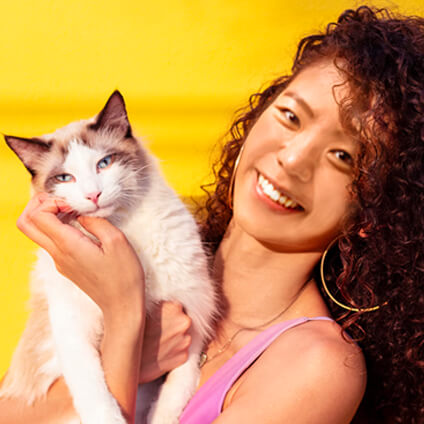
With over five years of specialized experience as an animal writer, my expertise lies in cat nutrition, health, behavior, grooming, and training. I am dedicated to delivering helpful and informative content that caters to the well-being of our feline friends. My primary goal is to empower pet owners with knowledge and ensure our feline companions thrive in health and happiness. In my free time, I love volunteering at local cat rescue centers.
